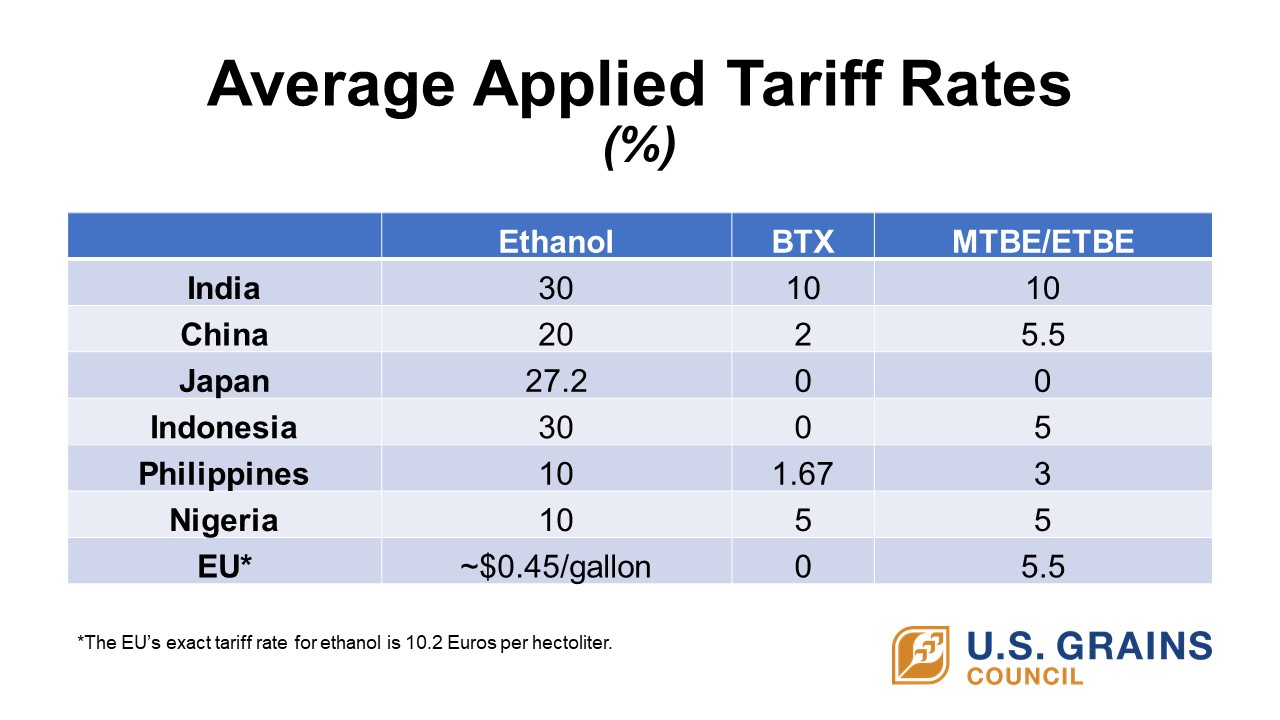
A recent U.S. Grains Council (USGC) analysis of World Trade Organization (WTO) tariff rates identified 19 markets in which ethanol is at a price disadvantage due to a lack of parity in energy tariff rates. Parity of tariff levels refers to equalizing the tariff rates between ethanol and other fossil fuel components, including MTBE (methyl tert-butyl ether), BTX (benzene, toluene and xylene) and others.
“At a minimum, countries should treat imports of gasoline and gasoline blending components at an equal tariff level, including ethanol,” said Candice Wilson, USGC manager of ethanol trade policy. “For countries seeking to promote environmentally friendly transportation options, equalizing tariff levels for ethanol is a critical way to support expanded ethanol blending to reach air quality and greenhouse gas (GHG) emission reduction goals.”
The Council’s analysis highlighted the need for parity in priority markets such as India, China, Japan and Indonesia and other targeted markets like the Philippines, Nigeria and the European Union. The Council is working with partners in countries around the world and representatives from the Office of the U.S. Trade Representative (USTR) and U.S. Department of Agriculture (USDA) on these parity issues. The collaboration between these groups has already proven successful in markets like Vietnam, where a five-percentage-point reduction on import tariffs for ethanol is expected to create opportunities for increased ethanol trade.
“Unequal tariff rates for ethanol and its alternatives are contradictory for a country’s commitments to cleaner air and a reduced carbon footprint,” Wilson said. “Parity is a tool for both increased ethanol use and achieving a country’s environmental goals.”
Previously, ethanol imports into Vietnam faced tariffs of 17 percent for 100 percent pure ethanol and 20 percent for 99 percent or less pure ethanol. The Council worked with the USDA’s Foreign Agricultural Service (USDA-FAS) in Vietnam to engage the Vietnamese Ministry of Industry and Trade (MOIT) and Ministry of Finance (MOF) to reduce these most favored nation (MFN) tariffs, which are the lowest possible tariff a country can assess on another country with most favored nation status.
Vietnam’s prime minister signed Decree 27 on May 25, 2020, which decreased the MFN tariff on certain agricultural imports, including ethanol. While the Council and its partners supported a tariff reduction in line with competing products like aromatics and other petrochemical oxygenates, the tariff was eventually reduced to 15 percent for both 100 percent pure ethanol and 99 percent or less pure ethanol, the maximum reduction applied to any commodity or product during this review period. The new tariff rate went into effect on July 10, 2020.
“Successes like the tariff reduction in Vietnam are part of a continuous effort to support the growth and stability of global ethanol markets,” Wilson said. “The Council will continue to work closely with relevant agencies and industry partners to encourage further reductions of tariff rates for ethanol across the globe.”
About The U.S. Grains Council
The U.S. Grains Council develops export markets for U.S. barley, corn, sorghum and related products including distiller’s dried grains with solubles (DDGS) and ethanol. With full-time presence in 28 locations, the Council operates programs in more than 50 countries and the European Union. The Council believes exports are vital to global economic development and to U.S. agriculture’s profitability. Detailed information about the Council and its programs is online at www.grains.org.
